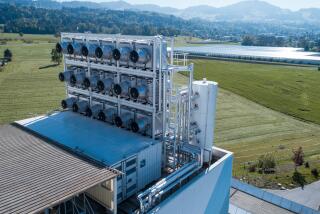Project Aims at Turning Landfill Gas Into Diesel : Energy: Irvine-based Ultrasystems says the Colorado plant is expected to produce several useful products and get rid of methane pollution as well.
- Share via
IRVINE — Ultrasystems Engineers and Constructors said Monday that it had won a $14-million contract to build a unique facility that will convert methane gas from landfills into diesel fuel and other useful materials.
If the experimental project in Pueblo, Colo., is successful, it could open the way for dozens of similar facilities at landfills in Southern California and elsewhere, said Ultrasystems Vice President Jackson Yu.
“This is a very exciting thing for us--and it could solve a major problem of what to do with landfill gas,” Yu said.
The Colorado plant is being built by Fuelco, a subsidiary of Public Service Co. of Colorado, and is expected to be operational by the end of the year.
Methane gas is produced as the garbage in a landfill decomposes, and at most landfills it is currently released into the atmosphere or burned, thus contributing to air pollution. The Fuelco plant will convert 5 million to 7 million square feet of methane per day into extra-clean diesel fuel, industrial wax, and naphtha, which is used to make solvents.
Fuelco owns the license to the conversion technology, which was initially developed as part of the Department of Energy’s Solar Energy Research Program and further refined by Rentech Inc. of Denver, which is also involved in the Pueblo project.
Yu said Irvine-based Ultrasystems, which is a unit of Hadson Corp., is handling the construction and engineering portion of the $16-million plant. The firm became involved with the effort about two years ago through its acquaintance with the former Department of Energy researchers who are now working at Rentech. Ultrasystems had also worked on similar technology for converting garbage to energy.
Al Lucas, a spokesman for Fuelco, acknowledged that there were still some risks associated with the project, since the technology has never been used on a large scale. But he said that the plant is expected to produce enough material to turn a profit and that Fuelco is already considering two other locations for similar facilities.
Yu added that the technology could be especially useful in Southern California because the Air Quality Management District has refused to allow the burning of methane gas for fuel at landfills. Further, he said, the diesel fuel produced by the process burns 50% cleaner than normal diesel, thus making another contribution to solving the air-pollution problem.
The conversion technology involves drilling wells into the landfill to capture the methane and the carbon dioxide that is produced along with it. Steam is added to the mixture in a common process called steam reforming, and the result is water and a synthetic hydrogen-carbon monoxide gas.
A second reaction converts that gas into five different hydrocarbons: wax, a water and alcohol mixture, diesel, naphtha and tail gases. Some of the tail gases are used to generate heat for the process and the rest are recycled; the water and alcohol mixture is also recycled.
At peak performance, the plant will produce about 180 barrels of diesel and 55 barrels of wax and naphtha per day, according to Fuelco. If successful, the technology could potentially be used at hundreds of landfills around the country, Yu said.
Ultrasystems specializes in building power-generation systems and will have 120 people involved in the project at the peak of construction.
More to Read
Inside the business of entertainment
The Wide Shot brings you news, analysis and insights on everything from streaming wars to production — and what it all means for the future.
You may occasionally receive promotional content from the Los Angeles Times.










